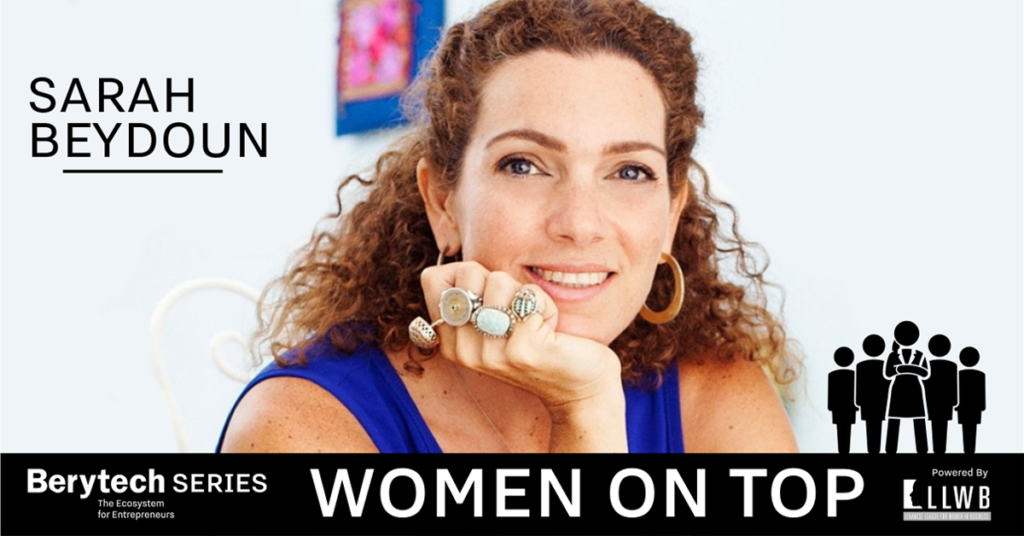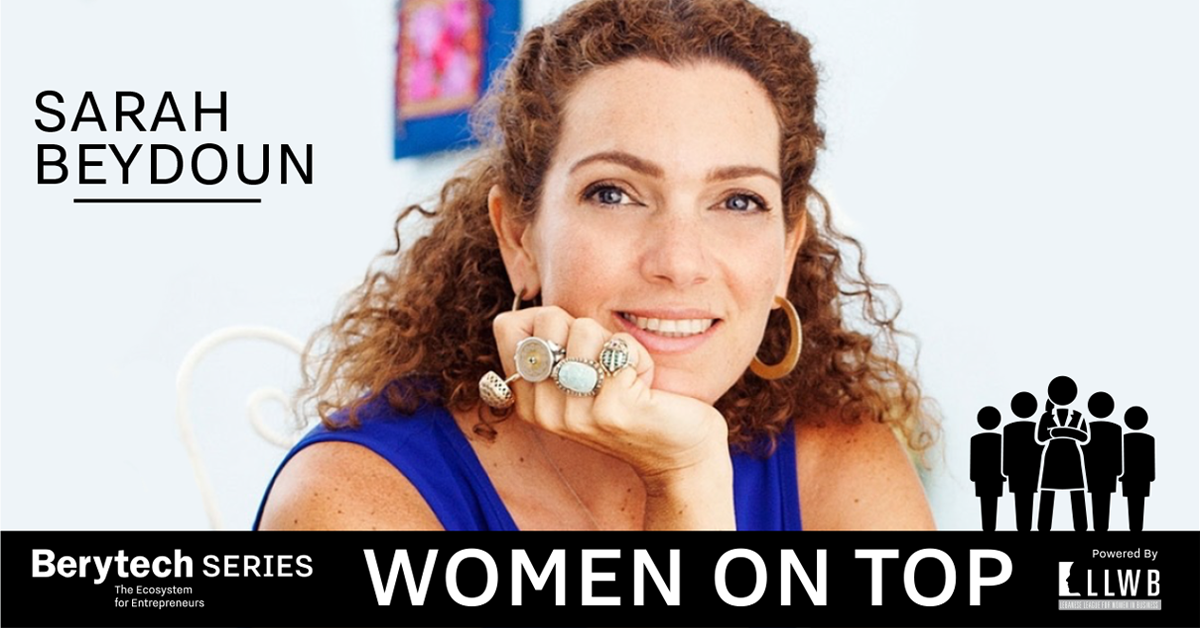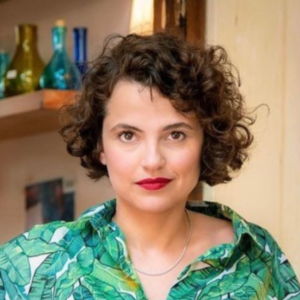
Dynamic, passionate and driven, with an epicurean’s delight in beauty and art, founder and creative director Sarah Beydoun designs handbags and accessories known for their stellar craftsmanship and vibrant, high-spirited appeal.
Born and raised in Beirut, Sarah’s unconventional journey in fashion began during the final year of her master’s degree in sociology, when she was conducting research at Dar Al Amal, a local NGO that rehabilitates women at risk and female ex-prisoners.
Soon after, she decided to set up a business that would employ the women she’d met during her fieldwork. She launched Sarah’s Bag in 2000, bringing together her love of fashion and design with the mission to empower underprivileged women. Sarah’s exuberant persona shines through each of her hip, whimsical and luxuriously handcrafted creations.
In 2014, in a push to expand the label’s international reach, Sarah’s sister Malak, an advertising and fashion publishing professional, joined the company as a partner.
In 2016, the Oslo-based Business for Peace Foundation awarded Sarah its annual prize in recognition of her work as a global business leader who is positively changing the face of business.
The Interview
- How did you get your business idea?
I launched Sarah’s Bag because I wanted to set up a project that would help underprivileged women and female prisoners rebuild their lives. 19 years ago, I was doing my graduate studies in sociology and conducting field research for my master’s thesis. I was working with a local NGO – Dar Al Amal, which teaches women-at-risk skills that will allow them to earn a living. I was inspired by my work with these women to start a business that would empower them and give them financial independence. Sarah’s Bag started as a fashion label and a social enterprise that allowed me to combine my passion for fashion and design with the desire to make a difference in the lives of underprivileged women in Lebanon.
2. What was the main drive that pushed you to start your business?
After a brief two-month-trial in the Baabda prison, I realized that I had found my vocation. I could marry my love of fashion and creation with empowering women through this project. My parents gave me a room in the basement of their building and I made it my atelier at the time. My best friend – Sarah Nahouli, started working with me. My other friend – Maria Hibri, proposed that I create a collection and sell it. I sold it in December 2000 and it was a success. After that, I knew that in order for this project to become sustainable, it had to become a business with a social mission. From then on, the project turned into « Sarah’s Bag ».
3. What was your biggest fear before starting up? How did you overcome it?
Setting up
4. How do you describe your core business activity and what’s the key value you offer to your customer?
What differentiates Sarah’s Bag from other fashion houses is our mission. When a customer purchases
5. What are the key strategies you use to expand your business?
The fashion world is moving towards creating direct contact with the client, and this is something we have adopted as a key strategy for our business. We’re lucky to operate in an era where we are closer to our clients through social media and our e-shop. This way, they remain close to our image and in touch with our mission.
Social media has been pivotal in establishing a direct link with our clients. We constantly engage with them, presenting new products and receiving their feedback on our collections especially through our website, www.sarahsbag.com. We’ve started increasing our dependence on our own channels rather than our retailers, so we can stay in touch with our clients.
6.What do you look for when recruiting an employee?
For key positions, I’m in search of pro-active individuals who are eager to learn. I look for people that could play more than one role in the company, seeing as we’re a small team. I honestly love it when previous scouts apply to the company, because I think they have the necessary empathy and skills to help underprivileged women while retaining the brand image. They should be able to balance the social and fashion aspect of the brand, all with a positive attitude! It’s important that they stay positive because we spend so much time together at the atelier, and it’s necessary that the environment is always motivating.
7. How many employees do you currently have? How do you describe your management style?
We have a group of around 200 artisans. We work with women in prisons and women who have been discharged from prison and have proven to be quite qualified and professional. We encourage them to seek out and employ other women in their villages. Some women find themselves extremely capable of forming groups of workers in the comfort of their own home, so they train other women and recruit them, thus creating a small atelier in their village. We have around 150 women working with us in villages and 50 women working with us from prison. The girls are all paid by piece depending on the time they take to execute each design. In prison, we pay all the girls regularly, we also pay the trainees in order to encourage them to keep up their work and become part of the team.
8. How do you describe yourself in 3 words?
Creative, enthusiastic, and hard-working.
9. What’s your favorite part of your business and why?
My favorite part is the
10. How do you advertise your business? How do you advertise your product/service?
Since the launch of the brand, we have been reliant on word of mouth. Our clients have been our biggest ambassadors across the years, wearing our bags and promoting our mission.
We don’t rely on traditional forms of advertising to market our products, like billboards or TV ads. We mainly rely on the press we receive. Being a social enterprise that empowers underprivileged women has put us in the spotlight from the very beginning. In 2000, when we launched our first collection, the local press was quick to react and instantly published articles about us. This has given us a responsibility and a motivation to continue what we started. Nowadays, social media has become a creative way to express ourselves and to introduce the world into another side of the brand, behind-the-scenes. We experiment with ways that help us market our products in a fun and approachable manner.
11. What made you choose this type of business?
Looking back, I realize that I was raised to become a social entrepreneur. I grew up with a very compassionate mother who taught us kindness and sympathy, and pushed us to believe in ourselves and think outside of the box.
12. If you had one piece of advice to someone just starting out, what would it be?
I would advise any entrepreneur to start a business that has a positive social impact built into its DNA. Having a purpose beyond profit makes work more meaningful and enriching, and it makes someone determined to succeed. I recently read something that stuck with me: “wanting to improve the world is a powerful driver for innovation”; this has been so true for me in my journey with Sarah’s Bag.
In addition, from a business perspective, social enterprises make perfect sense. Consumers today want meaning; they want to know what a company stands for, who is making the products, what kind of conditions they work in, etc. I think social businesses can tackle some of the world’s pressing problems that are sometimes beyond the reach of governments; it’s a missed opportunity to start a business built on the traditional profit model. Moreover, in the digital age, social media is a game changer for businesses: they now have direct interaction with clients who are looking for authenticity and a connection with the brands they’re buying into. Social enterprises have an edge here.
However, one thing I would say to anyone who wants to start a social enterprise is that in order to succeed, your product has to be able to stand on its own; don’t lean on the story alone. This is especially true for the fashion industry. The consumer has to fall in love with the product itself, and then the social aspect of the brand will pull them in and make them loyal clients
13. How do you balance the different aspects of your life? (well-being, family, social and professional)
Balancing everything on my plate is definitely not an easy task. It can get very, very messy! My schedule is always packed from morning to night so I can make them for everything, including exercise, work, family and friends. I rarely get any time to relax, and it can be exhausting, but it brings me great satisfaction.
Women On Top Series
Berytech has partnered with the Lebanese League for Women in Business – LLWB, to create ‘Women on Top’ to highlight women entrepreneurs and executives in a series of motivational interviews about their stories, overcoming their own challenges and their entrepreneurial endeavors. Read more.










